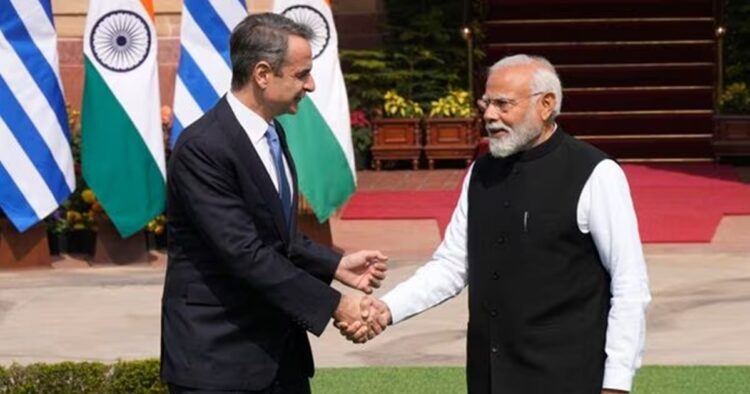Greek Prime Minister Kyriakos Mitsotakis praised Bharat’s electoral system, citing it as a global example of democracy’s resilience against challenges of scale. Speaking at the 9th Raisina Dialogue in New Delhi, Mitsotakis emphasized India’s ability to conduct elections smoothly despite its vast population, debunking misconceptions about the feasibility of democracy on a large scale. He commended Bharat’s democratic process as a model that fosters economic growth and should be celebrated worldwide.
#WATCH | At the ninth Raisina Dialogue in Delhi, Greek Prime Minister Kyriakos Mitsotakis says "…Elections here in India, convincingly challenge any flawed notion that significant scale is a barrier to democracy. You are an example to the world. An example which should be… pic.twitter.com/4IO3iS3YRc
— ANI (@ANI) February 21, 2024
The Raisina Dialogue, Bharat’s premier conference on geopolitics and geoeconomics, attracted foreign ministers and officials from various nations. Mitsotakis’s remarks underscored the importance of Bharat’s democratic success story, especially as the country prepares for its 18th Lok Sabha elections scheduled for March-April. His comments come amid ongoing debates within India about the efficacy and integrity of electronic voting machines (EVMs) and VVPATs.
However, Mitsotakis’s praise for India’s democratic system contrasts with concerns raised by some Bharatiya opposition leaders regarding the transparency of the electoral process. Figures like Congress leader Adhir Ranjan Chowdhury and AAP national convenor Arvind Kejriwal have criticized Prime Minister Narendra Modi’s predictions about the Bharatiya Janata Party’s (BJP) electoral success, raising suspicions about the functioning of EVMs.
Rashtriya Janata Dal (RJD) Rajya Sabha MP Manoj Jha expressed skepticism over PM Modi’s assertion of BJP securing 370 seats, questioning whether it implied manipulation of EVMs. This skepticism intensified following the Supreme Court’s intervention in the Chandigarh Mayor Elections, where irregularities were found in the counting process, leading to the overturning of the result.
The Supreme Court’s decision to invalidate the Chandigarh Mayor Elections result further fueled debates surrounding the credibility of Bharat’s current electoral mechanisms. The court found evidence of tampering by the Returning Officer, who had unlawfully invalidated votes cast in favor of a particular candidate. Such incidents have prompted renewed scrutiny of Bharat’s electoral infrastructure and raised concerns about the potential for malpractice in future elections.
In light of these developments, the discourse around Bharat’s electoral process has become increasingly contentious, with calls for enhanced transparency and accountability. As India gears up for another round of parliamentary elections, the integrity of its democratic institutions remains a focal point, both domestically and on the international stage.

















Comments